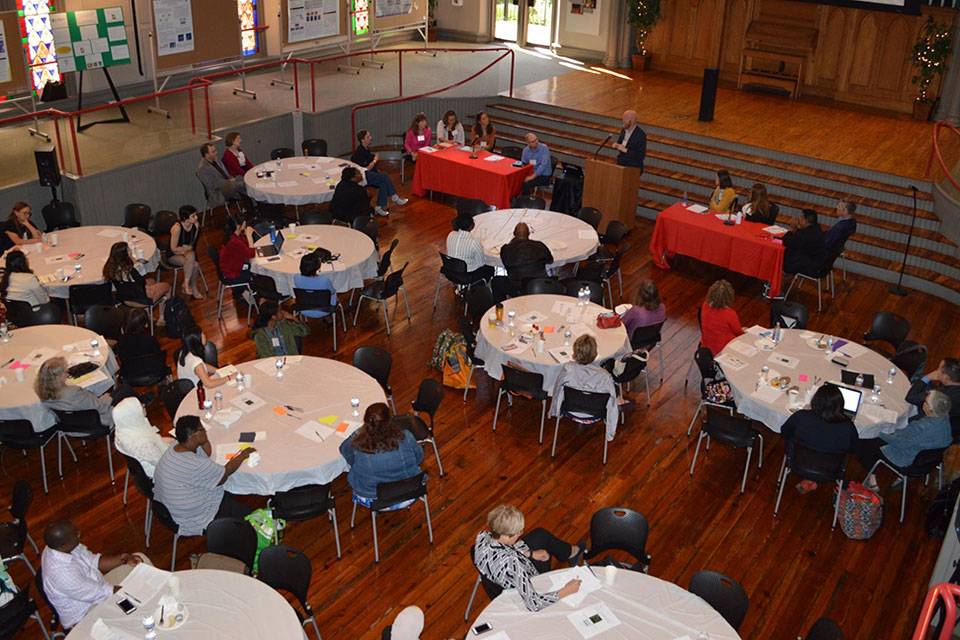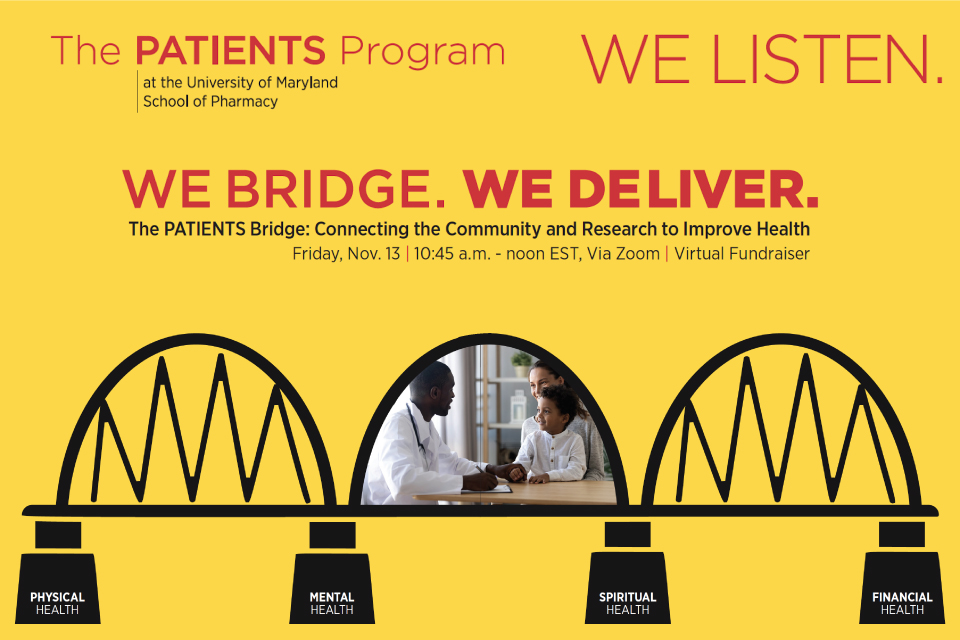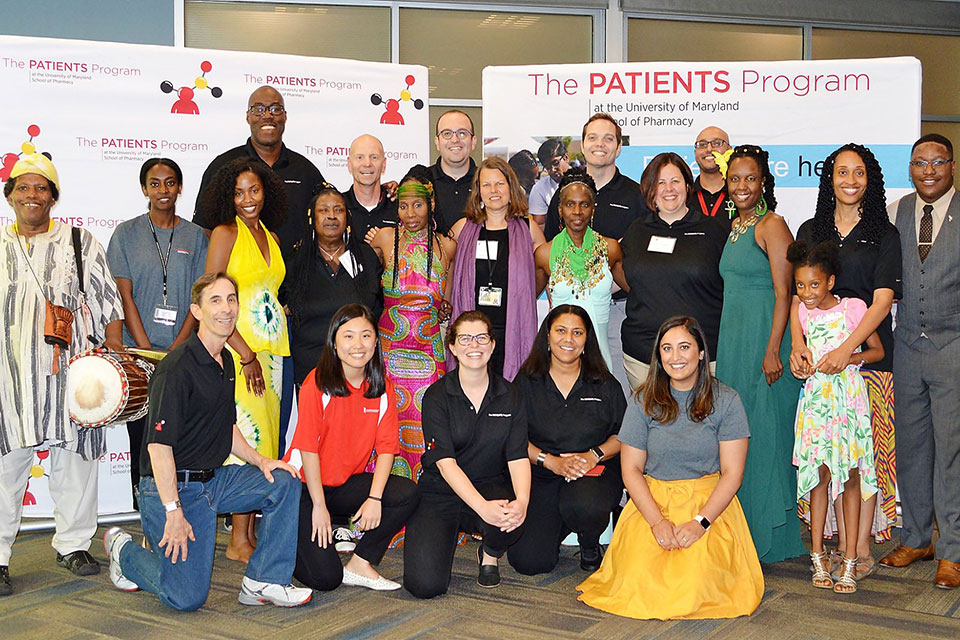The PATIENTS Program Hosts Conference Spotlighting Patient-Centered Outcomes Research
Presentations aimed to help shape how patients, caregivers, community members, and other stakeholders conduct patient-centered research in community-based settings and health care systems.

By Malissa Carroll
July 1, 2019
More than 100 researchers, patients, community members, and other stakeholders gathered in Westminster Hall in Baltimore on May 31, for “Making Learning Healthcare Systems More Patient-Centered.” Sponsored by The Patient-Centered Involvement in Evaluating the Effectiveness of Treatments (PATIENTS) Program at the University of Maryland School of Pharmacy and the Agency for Healthcare Research and Quality (AHRQ), the conference brought together researchers and patient partners from the seven institutions that received five-year infrastructure development grants from AHRQ in 2013, to share best practices and lessons learned for patient and stakeholder engagement in patient-centered outcomes research (PCOR).
“We want to move forward this idea of how patients can inform the learning health care system,” says C. Daniel Mullins, PhD, professor and chair of the Department of Pharmaceutical Health Services Research (PHSR) at the School of Pharmacy and executive director of The PATIENTS Program, one of the programs established by AHRQ’s five-year infrastructure development grants. “When AHRQ awarded this funding, it also set up a network to help our institutions learn from each other. We are very grateful to have this opportunity to share what we have learned today, and we hope to continue sharing this information across the country and around the world, so that every health care system can benefit.”
PCOR strives to help patients and their caregivers communicate with health care professionals to make informed decisions about their care. This conference aimed to expand on previous work in the fields of PCOR and community-engaged research (CEnR), empower stakeholder organizations and help build their capacity to participate in research activities, provide online and in-person education on emerging best practices in PCOR and CEnR, and increase awareness of and involvement in PCOR and CEnR among community and stakeholder partners.
“This conference has the potential to make an incredible impact on the field of PCOR,” says C. Jean Hsieh, PhD, staff fellow with AHRQ. “It offers an outlet through which the best practices developed by our seven grantee institutions can be disseminated to a broad range of stakeholders and their strategies shared through success stories to provide guidance to those in the field who are interested in implementing or further integrating PCOR in their health care systems. We know that incorporating PCOR in a health care system can facilitate the rapid adoption and implementation of evidence-based practice in that system; thereby, improving the quality of care and outcomes for its patients.”
The event kicked off with a “Listening and Learning” session, led by Mullins, that highlighted the patient’s perspective of Learning Health Care Systems. Developed by the National Academy of Medicine (formerly the Institute of Medicine), the Learning Health Care System model focuses on using the best available evidence to tailor care to each patient’s unique needs, while also helping to educate patients throughout the delivery of that care. Mullins was joined for his presentation by Cynthia Chauhan, a cancer survivor, patient advocate, and advisory board member for The PATIENTS Program.
“What I cannot underscore enough is that we are not subjects to be studied. We are participants. We are partners,” said Chauhan. “The best care happens when patients and professionals work together, communicate with each other, learn from each other, and share what they have learned with others.”
Following this session, the conference shifted focus to discuss approaches to help advance CEnR. Researchers from the Indiana University School of Medicine, Denver Health, and the University of Texas Southwestern Medical Center joined their patient partners in delivering presentations on a wide range of topics, such as how to build a patient-centered engagement core and use it in research, how to establish a community advisory panel to promote patient-centered research in a safety net health care system, and how to improve cancer screening through population health outreach interventions and strategies in a safety net health care system.
“Engagement happens when change is made; when there is a bi-directional exchange of information and someone changes the way his or her research is conducted,” said Megan O’Boyle, a patient partner who presented with Sarah Wiehe, MD, MPH, associate professor in pediatrics at Indiana University School of Medicine. “It isn’t simply listening and continuing to operate as you always have.”
The final session of the conference was dedicated to case studies in obtaining patient input for learning health care systems. The session featured presentations from researchers and patient partners from the University of Texas Medical Branch and the University of Missouri, with case studies that spanned from stroke rehabilitation and bioethical relationships to helping primary care practices collaborate with patients to improve chronic pain management.
“We have all of the ingredients to make a cake,” said John Cooks, a community partner who presented alongside Monique Pappadis, MEd, PhD, assistant professor in the Division of Rehabilitation Sciences at the University of Texas Medical Branch. “Everyone here today knows that, when it comes to patient care and research, it works best when you involve patients. We just need to put these ingredients together and make the cake, and then share that cake not only with patients and research participants, but also with current and future generations of health care professionals and researchers.”
Closing remarks were delivered by Brian Mittman, PhD, senior research scientist in the Division of Health Services Research & Implementation Science at Kaiser Permanente Southern California and senior scientist at the U.S. Department of Veterans Affairs Center for Healthcare Innovation, Implementation, and Policy in Los Angeles, who spoke about how health care has evolved in recent decades and how understanding this history is crucial to answering the questions surrounding the roles that patients can and should play in this area.
“We need organizations such as AHRQ and other groups that possess the knowledge, expertise, and resources to help us come together to share our insights and learn from each other,” said Mittman. “This support is what will continue to push us along this arc to a health care system that prioritizes patients’ needs and considerations, and allows us to continually learn, refine, and improve as health care professionals.”
Initially funded with a $5 million grant from AHRQ, The PATIENTS Program encourages patients, caregivers, and other stakeholders to be involved in every aspect of research studies. It partners with patients and care providers to answer questions about the best treatment options to improve health and quality of life, engaging people from all communities – especially individuals from underserved and minority populations – in every step of the PCOR process. The PATIENTS Program is committed to listening to the voice of the community, bridging research and the community, and delivering solutions that are important to the community. Ultimately, the program aims to build partnerships with local, regional, and national patient communities and health care systems; conduct and expand PCOR to help patients make better health care decisions; and put new programs in place for hospitals, doctors, nurses, and patients based on research findings.



